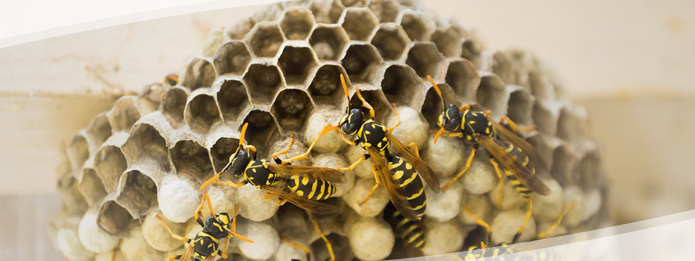Are There Wasps in Your House This Winter?

are pests that most people would much rather live without. During the warmer months, they can be found nesting in trees and eves of houses as well as flying around in gardens. You may be glad to get to the winter months, during which wasps disappear to hibernate. You’ll likely be less glad if you discover that they are hibernating in your home, however. Why do wasps do this and what wasp control measures can you use to get rid of them?
Can Wasps Hibernate in Houses?
Unfortunately, the answer is yes. Wasps live in colonies with a fertile queen who lays eggs to hatch new wasps. During the winter, the goal of the entire colony is to keep that queen alive. They try to do this by finding a hibernation spot in a warm and protected place. The other wasps may die of the cold or starve during the winter, but if they manage to keep the hibernating queen alive, the colony can live on.
As you may have guessed, our homes are often attractive hibernation spots for queens. They may find a crack in the attic or another quiet hiding place. In some cases, they have been known to hibernate in a heavy drape.
The good news is that the queen is sleeping, and the other wasps are more likely to be docile if they are still alive. There is less danger of being stung in the winter, even from more aggressive species of wasps. However, come spring, you may discover a new wasp colony inside your home. So, it is a good idea to address the problem early.
What Are the Common Types of Wasps?
You are most likely to encounter one of three wasp species: paper wasps, yellowjackets and black hornets. The first is relatively docile, especially in winter. Yellowjackets and black hornets are quite aggressive. Fortunately, they abandon their nests in winter and most of them will die naturally. That makes the cold months a good time to deal with wasp control and prevention.
How Do They Get In?
Wasps can get into homes through some surprisingly small passages. Cracks in your walls or little gaps in the eves of your roof may be enough. Nonetheless, there are a few steps you can take to help keep queens looking for hibernation spots out of your home.
Try to keep your windows and doors shut as much as possible. Obviously, you need to still go in and out of the house. Additionally, on a warmer day, you may want to open the windows for some fresh air. This is understandable, but be careful about what else you may be letting in. If you have fly screens, make sure they are well maintained and free from holes.
Open trash bins may attract wasp queens. These offer a food source and even a possible place to sleep. Make sure you empty your bins regularly and ensure that they are sealed with a tight lid.
Finally, keep your eyes open for nests around your home. Winter is a great time to have those nests removed. If there are any nearby nests, you are more likely to have a wasp queen hibernating in your home.
What Should You Do About Wasp Queens?
If you think there are wasps in your home in winter, call a professional for help. Wasp queens are quite difficult to find and can hurt you. They may be sleeping but they will still sting if disturbed.
As with all wasp control measures, it is best to have professional help. The right equipment and experience make all the difference.
If you are in Ontario and need help with wasps or other pests, contact Truly Nolen Pest Control. Our experienced team members can come to your house and help eliminate the problem promptly and effectively.